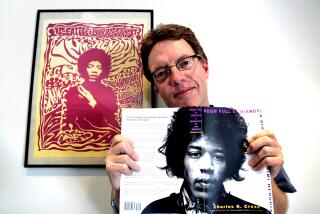Nirvana Laid Bare, With No Apologies
NIRVANA
“MTV Unplugged in New York”
Geffen
* * *
Because this is an acoustic album, thirtysomething-and-older rock fans may assume that it’s their best introduction to the late Kurt Cobain and the best chance to decide whether there is any truth to the talk of his being a Lennon-like spokesman for the restless ‘90s generation.
The collection, however, isn’t such an easy bridge between rock generations.
In moving away from the aggressive assault that made the band’s studio albums sometimes impenetrable to unsympathetic ears, Cobain wasn’t trying to make his songs more accessible in this late ’93 broadcast.
He wanted chiefly to explore other sides of his music in this softer, stripped-down setting and, crucially, to introduce his audience to music by other songwriters who had given him inspiration.
Figuring that everyone had heard enough of such hits as “Smells Like Teen Spirit” and even “Heart-Shaped Box,” Cobain devoted almost half his time on the show to songs by other writers. There is something to be learned from the six tunes, including three by the Arizona trio the Meat Puppets.
First, you are touched by the generosity of spirit of someone who chooses to use the national platform to salute others rather than plug his own product. And it’s hard for anyone who knows of Cobain’s own troubled background not to be moved by the way so many of his favorite songs speak about the search for self-identity and comfort.
But “Unplugged’s” most revealing moment is in the version of “All Apologies,” a song from 1993’s “In Utero” album and perhaps Cobain’s most naked expression of alienation and doubt.
What’s striking is the absence of self-pity in his voice, whose tone suggests simply an artist conveying his feelings, free of either a shield that hides the emotional scars or a false bravado that tries to exploit them.
“MTV Unplugged” (which includes two songs that weren’t in the telecast) offers a valuable glimpse into the soul of an artist, but it is Nirvana’s studio collections, notably “Nevermind” and “In Utero,” that remain the essential expressions of Cobain’s art and the beginning points in connecting with it.
New albums are rated on a scale of one star (poor), two stars (fair), three stars (good) and four stars (excellent).
More to Read
The biggest entertainment stories
Get our big stories about Hollywood, film, television, music, arts, culture and more right in your inbox as soon as they publish.
You may occasionally receive promotional content from the Los Angeles Times.










